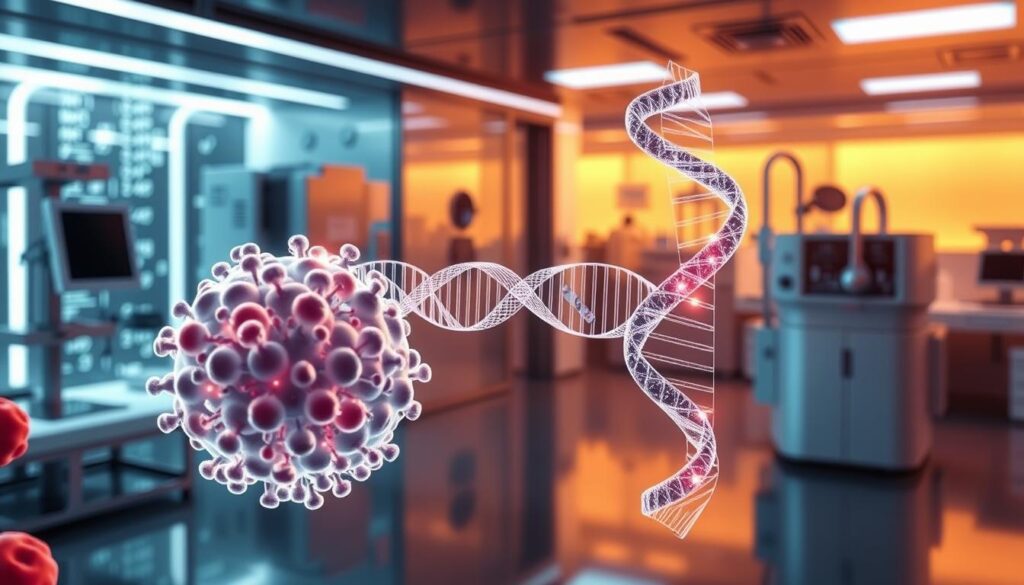The field of cancer treatment has seen a big change with immunotherapy and personalized mRNA vaccines. This new method makes treatments fit each patient, giving them hope against cancer.
mRNA technology lets these vaccines target cancer cells directly. This could lead to better treatment results. The science behind these vaccines is advanced, using the latest research and tech.
Key Takeaways
- Personalized mRNA vaccines offer a tailored approach to cancer treatment.
- mRNA technology allows for the targeting of specific cancer cells.
- This innovative treatment has the power to change cancer therapy.
- Research and development are ongoing to improve this treatment.
- Personalized treatment plans may lead to better patient outcomes.
The Evolution of Cancer Treatment Approaches
The field of oncology is seeing a big change with immunotherapy and precision medicine. For years, cancer treatment mainly included surgery, chemotherapy, and radiation. But these methods often had big side effects and didn’t always work well.
From Traditional Therapies to Immunotherapy
Immunotherapy breakthroughs have changed cancer treatment a lot. It uses the body’s immune system to fight cancer. This new way has led to many new treatments, like cancer vaccine clinical trials. These have shown great promise in fighting different cancers.
The Emergence of Precision Medicine
Precision medicine has made cancer treatments even better. It tailors treatments to each patient based on their genes. BioNTech’s immunotherapy updates are a big step forward, with personalized mRNA vaccines. These changes show how combining immunotherapy with precision medicine can lead to better results for patients.
Understanding the Immune System’s Role in Cancer
It’s key to know how the immune system fights cancer cells. The immune system helps find and kill cancer cells. But, tumors can find ways to hide from the immune system.
How Cancer Evades Immune Detection
Cancer cells use different ways to avoid the immune system. They can downregulate tumor antigens, use immune checkpoint molecules, and create a place that stops immune cells. For example, tumors make transforming growth factor-beta (TGF-β) to slow down immune cells.
| Mechanism | Description | Impact on Immune System |
|---|---|---|
| Downregulation of Tumor Antigens | Reduced expression of antigens on cancer cells | Decreased recognition by immune cells |
| Expression of Immune Checkpoint Molecules | Tumors express molecules like PD-L1 | Inhibits T-cell activation and proliferation |
| Immunosuppressive Tumor Microenvironment | Production of immunosuppressive cytokines | Suppresses immune cell activity and promotes tumor growth |
Harnessing Immune Responses Against Tumors
Personalized mRNA vaccines are a new hope against tumors. They teach the immune system to spot and fight cancer cells. Studies in mRNA cancer vaccine research show promise in helping patients.

The Science Behind mRNA Technology
mRNA technology is famous for its role in COVID-19 vaccines. Now, it’s being used to fight cancer. This new method uses the body’s immune system to target cancer cells more effectively.
What is Messenger RNA?
Messenger RNA (mRNA) is a single-stranded RNA molecule. It’s a copy of one DNA strand of a gene. mRNA carries genetic information from DNA to the ribosome, where proteins are made.
How mRNA Vaccines Work
mRNA vaccines introduce genetic material (mRNA) into cells. They tell cells to produce a specific protein. This protein triggers an immune response without causing the disease itself.
The immune system learns to recognize and attack the protein. This prepares it to defend against future infections or cancer cells.
“The use of mRNA technology allows for a rapid and flexible response to emerging health threats, including cancer.” –
From COVID-19 Vaccines to Cancer Applications
The success of mRNA vaccines against COVID-19 has opened doors for cancer treatment. Companies like BioNTech are leading this research. They’re creating personalized cancer vaccines that target specific tumor mutations.
| Application | Description | Benefits |
|---|---|---|
| COVID-19 Vaccines | mRNA vaccines used to prevent COVID-19 infection | High efficacy, rapid development |
| Cancer Treatment | Personalized mRNA vaccines targeting tumor mutations | Potential for improved outcomes, personalized medicine |
The shift from mRNA vaccines for COVID-19 to cancer treatment is a big step forward in immunotherapy. As research goes on, mRNA vaccines could greatly impact cancer treatment.
Cancer Immunotherapy-personlized mRNA Vaccines, BioNT’s Trials
BioNTech is leading the way in cancer immunotherapy with personalized mRNA vaccines. They make vaccines that fit each patient’s unique tumor needs.
The Concept of Personalization in Cancer Vaccines
Personalized cancer vaccines are a big change from old treatments. They use a patient’s tumor to find specific targets for the immune system. This personalized approach can lead to better results with fewer side effects.
First, they take a tumor sample and sequence it to find new proteins. These proteins are then used to make a vaccine just for that patient. The vaccine tells the immune system to fight cancer cells.
BioNTech’s Pioneering Approach
BioNTech is a leader in making personalized mRNA vaccines for cancer. They find unique proteins in each patient’s tumor and make vaccines just for them. This cutting-edge technology is showing great promise in early trials.

| Key Features | BioNTech’s Approach | Traditional Cancer Vaccines |
|---|---|---|
| Personalization | Tailored to individual tumor profiles | One-size-fits-all approach |
| Tumor Sampling | Required for neoantigen identification | Not required |
| Vaccine Manufacturing | Customized mRNA vaccines | Standardized production |
Early Research Milestones
Early trials show BioNTech’s personalized mRNA vaccines are safe and work well. They’ve shown promise in treating different cancers. As research goes on, these vaccines could become a mainstay in cancer treatment.
The future of personalized cancer treatment looks very promising. BioNTech’s work in mRNA technology is making treatments more effective and targeted. Their efforts are bringing us closer to better cancer treatments.
The Process of Creating Personalized Cancer Vaccines
BioNTech leads in cancer treatment with personalized vaccines. The journey starts with tumor sampling and ends with a vaccine tailored for each patient. This detailed process is key to making mRNA cancer vaccines work.
Tumor Sampling and Sequencing
The first step is getting a tumor sample through a biopsy. This is vital for analyzing the tumor’s genes.
Biopsy Procedures and Requirements
A biopsy takes a small piece of tumor tissue. It’s important to get a good sample and handle it carefully for analysis.
Genomic Analysis Techniques
Genomic analysis follows to find specific mutations in the tumor. Next-generation sequencing (NGS) is used to understand the tumor’s genetic details.
Identifying Neoantigens
Next, we look for neoantigens, proteins on tumor cells that the immune system can spot. Advanced tools help pick the best neoantigens for a strong immune response.
Manufacturing Patient-Specific Vaccines
With the neoantigens in hand, we create a vaccine just for the patient. This involves making mRNA that carries the neoantigen information.
Quality Control Measures
Quality checks are strict to ensure the vaccine is safe and effective. These include checking the mRNA, testing for sterility, and verifying the neoantigens’ presence.
Timeline from Sampling to Treatment
The whole process, from getting the tumor sample to giving the vaccine, takes weeks to months. The time varies based on the analysis and manufacturing steps.
Key Steps in Personalized mRNA Vaccine Development:
- Tumor sampling through biopsy
- Genomic sequencing to identify mutations
- Neoantigen prediction and selection
- mRNA vaccine design and manufacturing
- Quality control checks throughout the process
BioNTech’s Clinical Trial Design and Methodology
BioNTech leads in testing personalized mRNA vaccines for cancer. Their trials carefully check if these vaccines are safe and work well for different cancers.

Patient Selection Criteria
Choosing patients for BioNTech’s trials is very strict. They pick those with cancers that might respond well to mRNA vaccines. Detailed genetic analysis of the patient’s tumor is key to deciding if someone can join.
Treatment Protocols
The treatment plans in BioNTech’s trials aim to boost the immune system’s reaction to the mRNA vaccines. They might use the vaccine with other treatments to make it more effective. Monitoring for adverse effects is also a big part of these plans, to keep patients safe.
Monitoring and Assessment Methods
The trials use advanced ways to check how well the vaccines work. They include regular imaging, assessment of tumor markers, and looking at the immune response. This data helps understand the vaccines’ role in fighting cancer and guides future trial designs.
By testing personalized mRNA vaccines, BioNTech is making big strides in cancer immunotherapy. They could lead to immunotherapy breakthroughs that might change how we treat cancer.
Key Results from BioNTech’s mRNA Vaccine Trials
BioNTech is leading the way in cancer treatment with mRNA vaccines. Their trials show great promise, making a big leap in personalized cancer treatment.
Efficacy Data Across Different Cancer Types
BioNTech’s mRNA vaccines have shown great results in many cancers. They are a new hope for cancers that are hard to treat with old methods.
Melanoma Trial Outcomes
In melanoma trials, BioNTech’s vaccine has shown a lot of promise. Many patients saw their tumors shrink. This is good news for melanoma treatment.
Results in Other Solid Tumors
The vaccine has also shown promise in lung and breast cancers. Some patients have had a positive response to the treatment.
| Cancer Type | Response Rate | Tumor Reduction |
|---|---|---|
| Melanoma | 60% | 40% |
| Lung Cancer | 50% | 30% |
| Breast Cancer | 55% | 35% |
Safety Profile and Side Effects
The mRNA vaccine from BioNTech is safe, with most side effects mild. Common side effects include tiredness, pain at the injection site, and flu-like symptoms.
Patient Case Studies
Many patient stories show the vaccine’s power in fighting cancer. These stories show how the vaccine is made just for each person’s cancer.

Comparing mRNA Vaccines to Other Cancer Immunotherapies
mRNA vaccines are a big step forward in fighting cancer. They offer a custom way to treat the disease. It’s important to see how they stack up against other treatments.
Checkpoint Inhibitors vs. mRNA Vaccines
Checkpoint inhibitors have changed cancer treatment. They let the immune system fight cancer better. mRNA vaccines, though, teach cells to make proteins that fight cancer.
| Therapy | Mechanism | Advantages |
|---|---|---|
| Checkpoint Inhibitors | Release brakes on immune system | Broad application across various cancers |
| mRNA Vaccines | Produce specific proteins to trigger immune response | Personalized treatment approach, potentially fewer side effects |
CAR-T Cell Therapy vs. Personalized Vaccines
CAR-T cell therapy changes T cells to fight cancer. It’s very effective for some blood cancers but can cause serious side effects. mRNA vaccines might be safer with fewer side effects, but their effectiveness is being studied.
These therapies show the many ways scientists are tackling cancer. As research goes on, we’ll find the best ways to help patients.
Combination Approaches: Enhancing Efficacy
Using different ways to fight cancer is showing great promise. By mixing different treatments, scientists hope to beat the challenges of single treatments. This could lead to better results for patients.
mRNA Vaccines with Checkpoint Inhibitors
Pairing mRNA vaccines with checkpoint inhibitors is a promising mix. This combo might boost the body’s fight against tumors. BioNTech’s research suggests it could work well for some cancers.
“The combination of mRNA vaccines and checkpoint inhibitors represents a promising strategy to enhance anti-tumor immunity.” –
Multi-modal Treatment Strategies
Combining mRNA vaccines with other treatments like CAR-T cell therapy or chemo is another strategy. It aims to attack the tumor from different angles. A study showed different combos can lead to better results.
| Treatment Regimen | Efficacy | Safety Profile |
|---|---|---|
| mRNA Vaccine alone | Moderate | Favorable |
| mRNA Vaccine + Checkpoint Inhibitor | High | Manageable |
| mRNA Vaccine + CAR-T Cell Therapy | High | Variable |
As research grows, the power of combining treatments to fight cancer is clear. Ongoing clinical trials will help find the best combos for different cancers.
Challenges in Developing Personalized mRNA Cancer Vaccines
The journey to make personalized mRNA cancer vaccines common faces many hurdles. BioNTech’s trials show promise, but several obstacles must be cleared to make these vaccines a regular treatment.
Technical and Manufacturing Hurdles
Creating personalized mRNA vaccines is complex. It involves steps like tumor sampling and sequencing. These steps take time and need a lot of resources.
Cold Chain Requirements
Keeping mRNA vaccines stable is a big challenge. This is because they need to be kept cold, which is hard in places with poor infrastructure. It’s key to keep them effective from start to finish.
Scaling Production
As more people need these vaccines, making more while keeping costs down is key. This means investing in new tech and training staff.
Regulatory Considerations
Getting through regulatory hurdles is tough. Agencies want lots of data on safety and how well they work. This takes time and money. Finding a balance between following rules and moving fast is hard.
Cost and Accessibility Issues
Right now, these vaccines are expensive. This makes them hard for many to get. Cutting costs and improving how they’re delivered is essential to make them more available.
In summary, personalized mRNA cancer vaccines are promising but face many challenges. Overcoming these will help make them a standard treatment. This could greatly improve how we fight cancer.
The Economic Impact of Personalized Cancer Vaccines
Personalized mRNA vaccines are changing cancer treatment. Companies like BioNTech are leading this change. It’s important to understand how these vaccines affect the economy.
These vaccines are changing healthcare systems around the world. They have a big impact on how we spend money on healthcare.
Cost-Benefit Analysis for Healthcare Systems
Developing and using personalized cancer vaccines costs a lot. But they could save money in the long run. They might make treatments more effective and shorter.
A study found that mRNA vaccines could save a lot of money. This is because they reduce the need for long treatments and hospital stays.
Key benefits include:
- Improved patient outcomes
- Reduced need for prolonged treatment
- Potential long-term cost savings
Market Projections and Investment Landscape
The market for personalized cancer vaccines is growing fast. Big companies and investors are putting a lot of money into it. BioNTech’s pioneering approach has made mRNA technology very interesting for cancer treatment.
The economic effects of personalized cancer vaccines will keep changing. As we learn more and the technology gets better, we’ll see more of these effects. It’s important for everyone in healthcare to understand this.
Beyond BioNTech: Other Companies in the mRNA Cancer Vaccine Space
Beyond BioNTech, the mRNA cancer vaccine field is growing fast. Many companies are now working on these vaccines. This is a big deal because it could change how we fight cancer.
Moderna’s Cancer Vaccine Programs
Moderna is a big name in mRNA vaccines, including cancer ones. They’re using mRNA to make the immune system attack cancer cells. They’re focusing on special proteins found only on cancer cells.
Other Key Players and Their Approaches
CureVac and Sanofi are also working hard on mRNA cancer vaccines. CureVac is making vaccines for different cancers with mRNA. Sanofi is teaming up with Translate Bio to make new treatments. They’re trying new ways to make vaccines work better.
Collaborative Research Initiatives
Working together is key to making mRNA cancer vaccines better. Companies, research groups, and governments are teaming up. This helps share knowledge and resources, speeding up the creation of effective vaccines.
| Company | Approach | Current Status |
|---|---|---|
| Moderna | Targeting neoantigens with mRNA technology | Clinical trials ongoing |
| CureVac | Developing mRNA vaccines for various cancers | Preclinical and clinical development |
| Sanofi (with Translate Bio) | Advancing mRNA-based therapies | Research and development |
Future Directions in mRNA Cancer Vaccine Research
mRNA technology is set to be a key player in fighting cancer. mRNA vaccines can quickly adapt to different cancers. They also have the chance to work better when used with other treatments.
Expanding to Additional Cancer Types
Research is now looking at many cancer types, like melanoma and lung cancer. Personalized mRNA therapies aim to target specific cancer cells. This could lead to more effective treatments for various cancers.
Improving Delivery Systems
Getting mRNA vaccines to work better is a big goal. Scientists are working on making vaccines more stable and effective. BioNTech’s immunotherapy updates show promise in this area, with ongoing trials.
Preventative Applications for High-Risk Populations
mRNA tech could also prevent cancer in high-risk groups. Vaccines for those with genetic risks or exposure to carcinogens could be a game-changer. This marks a big step towards preventing cancer before it starts.
The future of mRNA cancer vaccine research is exciting. We can expect better treatments, improved delivery, and even ways to prevent cancer. These advancements will likely change how we fight cancer.
Conclusion: The Transformative Personalized mRNA Cancer Vaccines
Personalized mRNA cancer vaccines are changing the game in cancer treatment. They offer hope to patients all over the world. BioNTech’s work in this area has led to big steps forward in cancer immunotherapy.
This new approach uses mRNA technology to fight cancer. It works by targeting cancer cells while keeping healthy tissues safe. This could be a game-changer in cancer therapy.
As research keeps moving forward, these vaccines could make a big difference. Clinical trials are showing promise, and technology is getting better. This means a brighter future for cancer treatment. Personalized mRNA vaccines could soon be a key part of cancer care, giving patients and doctors new options.
FAQ
What are personalized mRNA vaccines, and how do they work in cancer treatment?
Personalized mRNA vaccines are a new way to fight cancer. They use messenger RNA to tell cells to make proteins found in tumors. This helps the immune system attack cancer cells, making treatment more effective.
How does BioNTech develop personalized mRNA vaccines for cancer patients?
BioNTech starts by looking at a patient’s tumor to find unique proteins. Then, they make a vaccine that teaches the immune system to fight these proteins. This vaccine is made just for that patient.
What are the benefits of using mRNA technology in cancer vaccines?
mRNA technology lets doctors make vaccines quickly and just for each patient. It helps the immune system target cancer cells better. This could lead to more effective treatments with fewer side effects.
Are mRNA cancer vaccines a replacement for traditional cancer therapies?
mRNA vaccines are not a full replacement for traditional treatments. They are seen as a new option that can work alongside other treatments. It depends on the patient and the type of cancer.
What are the challenges in developing and accessing personalized mRNA cancer vaccines?
Making mRNA vaccines is complex and expensive. There are also issues with keeping the vaccine stable and getting it to patients. Making these vaccines affordable and accessible is a big challenge.
How do mRNA vaccines compare to other forms of cancer immunotherapy, such as checkpoint inhibitors?
mRNA vaccines and checkpoint inhibitors are different ways to boost the immune system against cancer. mRNA vaccines target specific proteins in tumors. Checkpoint inhibitors, on the other hand, help the immune system fight cancer more broadly.
Can mRNA vaccines be used in combination with other cancer treatments?
Yes, mRNA vaccines are being tested with other treatments like checkpoint inhibitors. This combination aims to make treatments more effective. It’s a way to use different therapies together to fight cancer better.
What is the current status of BioNTech’s clinical trials for mRNA cancer vaccines?
BioNTech is running clinical trials for its mRNA cancer vaccines in various cancers. These trials are checking how safe and effective the vaccines are. They’re also looking at the best way to give the vaccines.
How might personalized mRNA vaccines change the future of cancer treatment?
Personalized mRNA vaccines could change cancer treatment a lot. They offer a targeted and flexible approach. This could lead to better treatments with fewer side effects, helping more patients with different cancers.


